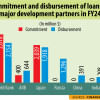Per capita foreign debt more than doubles in eight years
Per capita foreign debt of Bangladesh more than doubled in the last eight years, according to official data, as economists attribute the hike to unplanned foreign-funded projects and corruption, ultimately ballooning the liability on low-income people, including the extremely poor.
According to the Bangladesh Bank data, per capita external debt of the country surged 135 percent to $605 in fiscal year 2023-24 compared to fiscal year 2015-16.
The total stock of the external debt stands at $103.79 billion. Of the amount, the public sector holds $83 billion.
The country's external public debt servicing, which is already on an upward trend, will increase in the coming years, according to a statement by the Finance Division.
Total foreign debt servicing by the government, including repayment of the principal amount and interest, rose around 26 percent to $3.35 billion in fiscal year 2023-24 from $2.67 billion in 2022-23, central bank data shows.
Regarding the reasons for the higher per capita debt, Zahid Hussain, a former lead economist at the World Bank's Dhaka office, said, "It rose as the loans were not utilised appropriately, and in fact, a portion of the funds may have been returned abroad through capital flight."
"Expensive contracts were signed for implementing projects financed by foreign loans, and looters sent their funds abroad," he said. "Corrupt practices in project management and poorly chosen projects also fueled the problem."
For instance, Hussain said a couple of power plants were built in Khulna's Rupsha area with foreign financing, but there is no source of primary input gas beside the projects. So, the projects are now sitting idle, yet the debt was incurred.
The economist said if the generated power went to factories, it would help production and exports, bringing in foreign currency.
When asked whether the country's per capita debt data is alarming, Hussain said that while the per capita debt is rising, the country's per capita income is also rising. So, the major concern lies in the debt-to-GDP ratio, which is increasing.
The external debt-to-GDP ratio rose to 22.6 percent in fiscal year 2023-24 from 15.5 percent in fiscal year 2015-16, data showed.
"If we compare the debt considering the economy's size with other countries, this is not too high. I would say this is moderate considering our GDP size," he commented.
"But, we have to see whether we are facing any difficulties in repaying the loans. The country's foreign exchange reserves have been impacted in the last two years to continue debt servicing."
The former World Bank lead economist said debt repayment is creating stress considering the dollar liquidity, though it is not too high given the high GDP.
An important factor, according to Hussain, is the outstanding (arrear) of state-run enterprises which accrued when the country bought electricity, fertilisers, etc., and these are not included in the foreign debt accounting.
The arrear of the state-owned enterprises (SOEs) may be around $5 billion, he said, referring to media news.
"The arrear was rising due to dollar shortages and low revenue earnings of the companies."
Regarding the current interim government's endeavour to get more foreign loans amid the higher per capita debt, Hussain said, "The government will have to repay the arrears, so it has no other option but to go for more loans."
As foreign arrears must be repaid to continue getting power and fertilisers, the government needs loans. Already, the sourcing companies and countries have informed that if Bangladesh does not repay the arrears, they will not be able to send furnace oil or fertilisers in the future.
"If we cannot import them, how will we run the economy? So, the country needs cash dollars," said Hussain.
According to him, to get cash dollars, loans from the International Monetary Fund (IMF) and World Bank are an option and these loans have comparatively low costs.
Without this, the government has no other big way, he said, adding, the government should use all types of instruments as they are now seeking budget support in most cases.
For instance, the government can take funds through investment project financing, guarantees, etc, which can reduce the foreign exchange payment burden, he added.


 For all latest news, follow The Daily Star's Google News channel.
For all latest news, follow The Daily Star's Google News channel. 





Comments